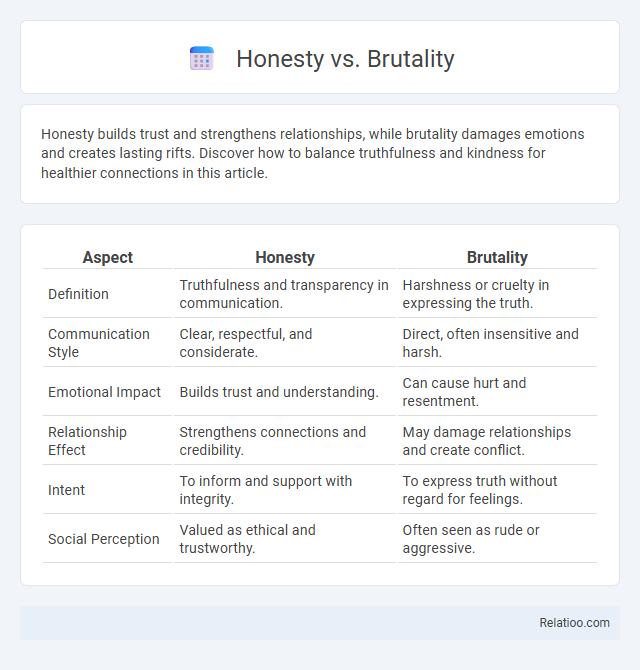Honesty builds trust and strengthens relationships, while brutality damages emotions and creates lasting rifts. Discover how to balance truthfulness and kindness for healthier connections in this article.
Table of Comparison
| Aspect | Honesty | Brutality |
|---|---|---|
| Definition | Truthfulness and transparency in communication. | Harshness or cruelty in expressing the truth. |
| Communication Style | Clear, respectful, and considerate. | Direct, often insensitive and harsh. |
| Emotional Impact | Builds trust and understanding. | Can cause hurt and resentment. |
| Relationship Effect | Strengthens connections and credibility. | May damage relationships and create conflict. |
| Intent | To inform and support with integrity. | To express truth without regard for feelings. |
| Social Perception | Valued as ethical and trustworthy. | Often seen as rude or aggressive. |
Understanding Honesty and Brutality: Core Definitions
Honesty involves conveying truth with clarity and integrity, prioritizing transparency without causing unnecessary harm. Brutality, by contrast, is characterized by harsh, insensitive delivery that may damage emotions despite revealing facts. Understanding the core differences between honesty and brutality is essential for fostering healing through balanced communication grounded in empathy and respect.
The Fine Line: When Truth Becomes Brutal
Honesty walks a fine line between transparency and brutality, where delivering the unvarnished truth can sometimes cause more harm than healing. Your challenge lies in balancing honesty with empathy, ensuring that truth serves to foster understanding rather than inflict unnecessary pain. Recognizing when honesty shifts into brutality allows you to communicate with compassion while still honoring the integrity of the message.
Social Perceptions: Valuing Honesty vs. Condemning Brutality
Social perceptions often prioritize honesty as a virtue essential for trust and integrity, while brutality is widely condemned for its harm and insensitivity. Your ability to communicate truth with empathy fosters healing and positive relationships, avoiding the alienation caused by harshness. Balancing honesty with compassion enhances social cohesion and promotes mutual understanding within communities.
Emotional Impact: How Words Shape Feelings
Words possess immense emotional power, influencing your feelings profoundly by balancing honesty, brutality, and healing. Honest communication fosters trust and clarity, while brutality can wound deeply, causing lasting emotional scars. Healing language promotes empathy and recovery, guiding your emotions toward understanding and resilience.
Honesty as Constructive Feedback
Honesty as constructive feedback promotes growth by providing clear, actionable insights without damaging trust or morale. Unlike brutality, which can alienate and demoralize, honest feedback balances transparency with empathy to foster understanding and improvement. This approach supports emotional healing by encouraging open communication and reinforcing positive development.
The Consequences of Brutal Truths
Brutal truths can lead to emotional distress, damaging relationships by undermining trust and fostering resentment. The harshness of unfiltered honesty often causes defensive reactions, preventing constructive dialogue and healing. Balancing truth with empathy is essential to minimize harm and promote genuine understanding and recovery.
Honesty in Relationships: Building Trust or Causing Harm?
Honesty in relationships serves as the foundation for building trust, fostering open communication and emotional safety between partners. However, honesty without empathy can lead to brutality, causing unnecessary harm and damaging the connection. Balancing honesty with sensitivity promotes healing, allowing couples to address issues constructively while preserving mutual respect.
Effective Communication: Balancing Truth with Empathy
Effective communication involves balancing honesty with empathy to foster understanding without causing harm. Your message should convey truth clearly while considering the emotional impact on the listener, ensuring healing rather than brutality. Striking this balance enhances trust and promotes constructive dialogue in both personal and professional relationships.
Cultural Differences in Expressing Truth
Honesty, brutality, and healing represent varied approaches to expressing truth influenced by cultural norms and values. In some cultures, direct honesty is valued and seen as a way to promote healing through transparency, while others prioritize harmony and may view blunt honesty as brutality that disrupts social cohesion. Understanding these cultural differences helps you navigate conversations sensitively, respecting diverse communication styles that shape how truth is conveyed and received.
Choosing the Right Approach: Honesty, Brutality, or Compassion?
Choosing the right approach between honesty, brutality, and compassion depends on the context and desired outcome, where honesty fosters trust and clarity without unnecessary harm. Brutality may deliver raw truth but risks damaging relationships and emotional well-being. Your ability to balance truthful communication with empathy ensures effective healing and constructive dialogue that respects all parties involved.

Infographic: Honesty vs Brutality
 relatioo.com
relatioo.com